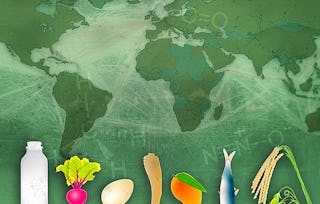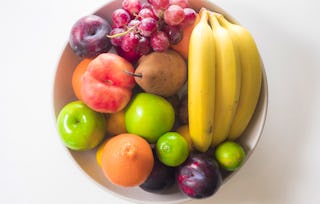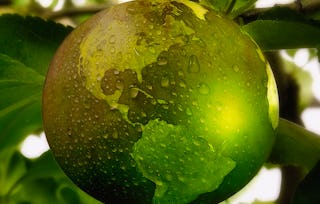A food system encompasses the activities, people and resources involved in getting food from field to plate. Along the way, it intersects with aspects of public health, equity and the environment. In this course, we will provide a brief introduction to the U.S. food system and how food production practices and what we choose to eat impacts the world in which we live. We will discuss some key historical and political factors that have helped shape the current food system and consider alternative approaches from farm to fork. The course will be led by a team of faculty and staff from the Johns Hopkins Center for a Livable Future. Guest lecturers will include experts from a variety of disciplines, including public health, policy and agriculture.

An Introduction to the U.S. Food System: Perspectives from Public Health

An Introduction to the U.S. Food System: Perspectives from Public Health



Instructors: Keeve Nachman, PhD, MHS
15,160 already enrolled
Included with
164 reviews
Skills you'll gain
Details to know

Add to your LinkedIn profile
See how employees at top companies are mastering in-demand skills

There are 6 modules in this course
Welcome to our short course on the U.S. food system. In this first series of lectures, we dig into the very important concepts of food systems, food security and intergenerational equity and begin to explore what we eat, how that food is produced, and how our dietary choices impact our health and the health of the planet. This broad overview lecture lays the foundation for the rest of the course.
What's included
14 videos4 readings1 assignment1 discussion prompt
This lesson expands on the concepts of food system sustainability and resilience, and describes strategies that could dramatically improve the food system and the ability of future generations to feed themselves.
What's included
5 videos1 reading1 assignment1 discussion prompt
The 1938 USDA Yearbook of Agriculture stated, “Essentially, all life depends upon the soil ... There can be no life without soil and no soil without life; they have evolved together”. In this module, we will take a very brief look at the importance of methods of food production for sustainability, resilience, food security and health.
What's included
7 videos1 reading1 assignment1 discussion prompt
We will now examine the livestock and seafood industries, which we have touched on in previous modules as a key driver of the global food system. As incomes rise around the world, so too does the global collective appetite for meat. Some of our greatest challenges and debates of the 21st century are rooted in the rising demand for animal protein in an era of dwindling resources and climate change. NOTE: This lecture refers to other lectures offered in this or related full for-credit courses at the Bloomberg School of Public Health.
What's included
7 videos1 reading1 assignment1 discussion prompt
In the next set of lectures, we begin to explore food and farm policy, a huge and complex topic. Roni Neff returns with an overview of the history and content of the current farm bill and why it really should be called a ‘food bill’, considering the magnitude of its impact on public health. Then Mark Winne will share his experiences as an advocate for community food security and regional food systems here in the U.S. For those of you interested in the international perspective of food policy, we have provided in the readings list a link to a terrific talk by Olivier deSchutter, the former UN special rapporteur on the Right to Food.
What's included
8 videos1 reading1 assignment1 discussion prompt
In this final module of the course you will hear from real people working to build a healthier, more sustainable food system. First, Michael Heller of Clagett Farm in Maryland will share his farming philosophy and how he links his farm to the local community near Washington DC. Then you’ll hear about Meatless Monday as an example of using health communication campaigns to change the food system from the demand-side. The optional Honors lesson includes two short films produced by CLF showcasing projects and people around the U.S. that are improving the food system from field to plate.
What's included
8 videos5 readings1 assignment1 peer review1 discussion prompt
Instructors



Offered by
Explore more from Public Health
 Status: Preview
Status: PreviewJohns Hopkins University
 Status: Preview
Status: PreviewStanford University
 Status: Free Trial
Status: Free TrialStanford University
 Status: Preview
Status: PreviewUniversity of Pennsylvania
Why people choose Coursera for their career

Felipe M.

Jennifer J.

Larry W.

Chaitanya A.
Learner reviews
- 5 stars
77.43%
- 4 stars
18.90%
- 3 stars
3.04%
- 2 stars
0%
- 1 star
0.60%
Showing 3 of 164
Reviewed on Sep 20, 2019
Good, basic course for someone not familiar with the US food system. Very fact-based with easy to understand discussion of scientific and economic topics.
Reviewed on Apr 28, 2018
Loved it! I recommend it to anyone new to public health, horticulture, agriculture, farming, agroecology and the like. I wish I took this course sooner. A+
Reviewed on Aug 27, 2017
I really enjoyed learning about all the different aspect surrounding the U.S. food system. The video lectures were very clear and informative!

Open new doors with Coursera Plus
Unlimited access to 10,000+ world-class courses, hands-on projects, and job-ready certificate programs - all included in your subscription
Advance your career with an online degree
Earn a degree from world-class universities - 100% online
Join over 3,400 global companies that choose Coursera for Business
Upskill your employees to excel in the digital economy
Frequently asked questions
To access the course materials, assignments and to earn a Certificate, you will need to purchase the Certificate experience when you enroll in a course. You can try a Free Trial instead, or apply for Financial Aid. The course may offer 'Full Course, No Certificate' instead. This option lets you see all course materials, submit required assessments, and get a final grade. This also means that you will not be able to purchase a Certificate experience.
When you purchase a Certificate you get access to all course materials, including graded assignments. Upon completing the course, your electronic Certificate will be added to your Accomplishments page - from there, you can print your Certificate or add it to your LinkedIn profile.
Yes. In select learning programs, you can apply for financial aid or a scholarship if you can’t afford the enrollment fee. If fin aid or scholarship is available for your learning program selection, you’ll find a link to apply on the description page.
More questions
Financial aid available,
¹ Some assignments in this course are AI-graded. For these assignments, your data will be used in accordance with Coursera's Privacy Notice.

